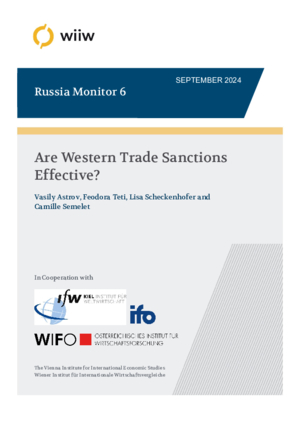Are Western Trade Sanctions Effective?
Vasily Astrov, Lisa Scheckenhofer, Camille Semelet and Feodora Teti
Russia Monitor No. 6, September 2024
21 pages including 2 Tables and 2 Figures
Recent high-frequency data suggest a further strengthening of growth momentum, driven by the ongoing tightness of the labour market and the muted response of credit expansion to last year’s monetary policy tightening. At the same time, the short- and medium-term fiscal outlook has brightened – despite increased military and social spending. On the external front, imports picked up at the end of 2023, but have suffered more recently due to increased payment difficulties – a result of renewed US pressure on banks from third countries dealing with Russia. The effectiveness of trade sanctions crucially hinges on the degree to which missing high-quality Western goods can be replaced with lower-quality products from third countries. Our calculations suggest that in 2023, the share of sanctioned CHP items that Russia was able to obtain ranged from 60% to 170% of the 2021 level, depending on underlying assumptions regarding the extent of the deterioration in quality.
Reference to wiiw databases: wiiw Monthly Database
Keywords: economic growth, fiscal situation, foreign trade, sanctions, unit value ratios
JEL classification: F14, F51, H20, H62, O10
Countries covered: Russia
Research Areas: Macroeconomic Analysis and Policy, International Trade, Competitiveness and FDI
